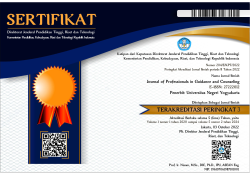Solution-focused brief counseling in reducing the negative impact of problematic online game use
Sigit Hariyadi, Universitas Negeri Semarang, Indonesia
Edwindha Prafitra Nugraheni, Universitas Negeri Semarang, Indonesia
Eni Rindi Antika, Universitas Negeri Semarang, Indonesia
Shania Dea Menany Soputan, Universitas Negeri Semarang, Indonesia
Abstract
The study purposed to examine the effectiveness of the solution-focused brief counseling (SFBC) intervention to reduce the negative impacts of problematic online games use (POGU) in college students. The research subjects were chosen by purposive sampling method of students who have problems with online games at the Universitas Negeri Semarang (UNNES). The study was conducted with an embedded experimental research design in which the data was obtained using a quantitative approach. POGU and online addiction games were included in the characteristics of people with internet addiction (IA) based on the diagnostic and statistical manual of mental disorders, fourth edition (DSM-IV) criteria that have a negative impact. Based on the study, negative effects of playing online games included low self-control, not being able to reduce the length of time playing online games and having thoughts (preoccupation cognitive) that could not be controlled and weakening the brain work systems causing the online game addicts. The form of intervention used in the study was SFBC. The SFBC stages carried out included building relationships, identifying complaints that could be resolved, setting goals, designing, and implementing interventions, termination, evaluation, and follow-up.
Keywords
Full Text:
PDFReferences
Hoy, W. K. & Miskel, C. G. (2008). Educational administration: Theory, research, and practice (8th ed.). New York, NY: McGraw-Hill International Edition.
Capuzzi, D., & Gross, D.R. (2007). Counseling and Psychotherapy: Theories and Interventions (4th edition). New Jersey: Merrill Prentice Hall
Corey, Gerald. (2016). Theory and Practice of Counseling & Psychotherapy (9th edition). Belmont, CA: Brooks/Cole
Creswell, John. (2015). Riset Pendidikan: Perencanaan, Pelaksanaan, dan Evaluasi Riset Kualitatif dan Kuantitatif Edisi kelima (terjemahan oleh Helly Prajitno Sucipto dan Sri Mulyantini S). Yogyakarta: Penerbit Pustaka Pelajar.
Creswell, John W., & Clark, Vicki L. P. (2007). Designing and Conducting Mixed Methods Research. California: Sage Publications, Inc.
Fuster, H., et al. (2012). Psychological Motivation in Online Role-Playing Games: A Study of Spanish World of Warcraft Players. Anales De Psicologia, 28 (1), 274-280.
Gay, L.R, Mills. G.E., & Airasian, P (2009). Educational Research:Competencies for Analysis and Applications (9th edition). New Jersey: Pearson Education, Inc.
Gladding, Samuel, T. (2009). Counseling A Comprehensive Profession: Sixth edition. New Jersey: Pearson Education, Inc
Griffiths MD. (2005). A Components Model of Addiction Within a Biopsychosocial Framework. Journal of Substance Use, 10(4), 191–197. doi:10.1080/14659890500114359
Herdiansyah, Haris. (2015). Metodologi Penelitian Kualitatif Untuk Ilmu Psikologi. Jakarta: Penerbit Salemba Humanika.
Kim, M. G., & Kim, J. (2010). Cross-validation of reliability, convergent and discriminant validity for the problematic online game use scale. Computers in Human Behavior, 26(3), 389–398.
Kowert, R., Festl, R., & Quandt, T. (2014). Unpopular, Overweight, and Socially Inept: Reconsidering the Stereotype of Online Gamers. CyberPsychology, Behavior and Social Networking, 17(3), 141–146. doi:10.1089/cyber.2013.0118
Lemmens, J. S., Valkenburg, P. M., & Peter, J. (2009). Development and Validation of a Game Addiction Scale for Adolescents. Media Psychology, 12(1), 77–95. doi: 10.1080/15213260802669458.
Lines, Dennis. (2006). Brief Counseling in Schools: Working with Young People from 11-18 (2nd Edition). London: Sage Publication
Perakyla, Anssi et al. (eds). (2008). Conversation Analysis and Psychotherapy. London: Cambridge University Press
Prochaska, J.O., & Norcross, J.C. (2007). System of Psychotherapy: A Transtheoritical Analysis (6th ed). CA: Brooks/Cole
Richer, Katrin A. (2015). How clients and solution focused therapists co-construct new meanings when having conversations about ‘What’s better?’. Thesis
Seligman, L. (1994). Developmental Career Counseling and Assessment 2nd Edition. California: Sage.
Sugiyono. (2007). Memahami Penelitian Kualitatif. Bandung: Penerbit Alfabeta
Sharf, R.S. (2004). Theories of Psychotherapy and Counseling: Concepts and Cases. Singapore: Brooks/Cole-Thomson Learning
Sperry, Len. (2010). Highly Effective Therapy: Developing Essential Clinical Competencies in Counseling and Psychotherapy. New York: Routledge Taylor & Francis Group
Yee, Nick. (2007). Motivations of Play in Online Games. Journal of CyberPsychology and Behavior, 9, 772-775. doi:10.1089/cpb.2006.9.772
Young, K. S. (1998). Caught in the Net: How to recognize the signs of Internet addiction and a winning strategy for recovery. New York: Wiley
Williams, S. (2018). Are Behavioral Addictions The Same As Drug Addiction? Retrieved from https://www.mentalhelp.net/articles/are-behavioral-addictions-the-same-as-drugs-addictions/
Williams, D., Yee, N., & Caplan, S. E. (2008). Who Plays, How Much, and Why? Debunking the Stereotypical Gamer Profile. Journal of Computer-Mediated Communication, 13(4), 993–1018. doi: 10.1111/j.1083-6101.2008.00428.x
Wu, T. C., Scott, D., & Yang, C. C. (2013). Advanced or Addicted? Exploring The Relationship of Recreation Specialization to Flow Experiences and Online Game Addiction. Leisure Sciences, 35 (3), 203-217.
Young, K. (2015). Video games: Recreation or Addiction?. Psychiatric Times, 32 (4), 27-27.
DOI: https://doi.org/10.21831/progcouns.v3i2.53985
Refbacks
- There are currently no refbacks.

This work is licensed under a Creative Commons Attribution-ShareAlike 4.0 International License.
Supervised by:

Our journal indexed by:
ISSN 2722-6581 (print) || ISSN 2722-2012 (online)
ProgCouns Stats










